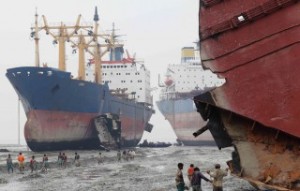A total of 51 vessels were sold for demolition during October 2016, with the majority of them destined for the Indian subcontinent, VesselsValue data shows.
India was the favorite destination for demolition sales, with Bangladesh as the second country where most of the ships were delivered.
Bulkers, container ships and small dry bulk carriers were at the top of the list of demolition sales by vessel type globally.
In addition, bulkers, container ships and tankers topped the list of demolition sales by ship type in the Indian subcontinent.
Separately, a representative from NGO Shipbreaking Platform said that approximately 90 ships were dismantled in the tenth month of this year, taking into account smaller vessels, too.
Out of these, 40 ships were dismantled in India, 15 in Bangladesh, 15 in China, 10 in Pakistan and 10 in Turkey.
Due to the overcapacity in the shipping industry, 2016 could be the busiest year on record in ship recycling as the total amount of scrapped tonnage is likely to reach 40 million dwt, compared to 30 million dwt demolished in 2015, according to BIMCO’s forecast. This means that more vessels could be scrapped on South Asian beaches of Pakistan, India and Bangladesh.
Attracted to a higher return on scrap steel and choosing to ignore unsafe working conditions, most ship owners opt for the worst shipyards in South Asia.
The driving force behind the increased number of scrapped tonnage is the price difference between clean and safe recycling and worst yards in South Asia, NGO Shipbreaking Platform’s Executive Director, Patricia Heidegger, said.
The standard practice has been for ship owners to sell their vessels to South Asian yards via cash-buyers, companies that specialize in the trade of end-of-life tonnage.
Cash-buyers promise ship owners not only the highest price but also to free them from responsibility to properly deal with end-of-life management of their ships, according to BIMCO.
Vessels contain large amounts of toxic materials and would yield less profit if sold to a recycling facility that follows environmental and occupational health and safety standards.
Given the fact that South Asian governments have still not enforced laws and international standards related to shipbreaking activity, environmental pollution, safety and exploitation are the biggest concerns affecting this sector.
Earlier this month, more than twenty people lost their lives in a series of explosions aboard an oil tanker which was being dismantled at the Gadani shipbreaking yard in Pakistan.
Copyright Ships & Ports Ltd. Permission to use quotations from this article is granted subject to appropriate credit given to www.shipsandports.com.ng as the source.

